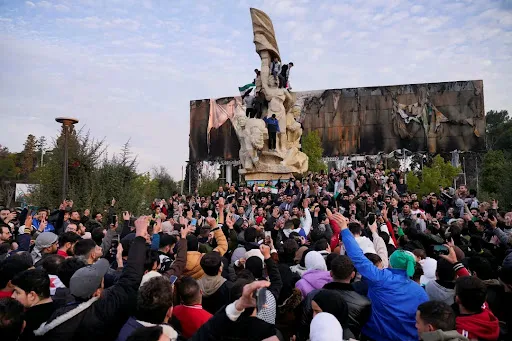Syria, a nation long plagued by conflict and authoritarian rule, now faces a pivotal moment in its history. Rebel forces, led by the Islamist group Hayat Tahrir al-Sham (HTS), have delivered a decisive blow to the regime of Bashar al-Assad, capturing several key cities and bringing the fight to the heart of Damascus. President Assad, who once wielded near-absolute power, has reportedly fled the country, leaving behind a legacy of repression and a nation in chaos.
Assad’s Legacy of Power and Controversy
Bashar al-Assad, the son of long-time ruler Hafez al-Assad, assumed power in 2000 after his father’s death. Initially seen as a potential reformer due to his Western education and mild demeanor, Assad quickly consolidated power, proving to be as autocratic as his father. His regime maintained a tight grip on Syrian society through a mix of military force, political repression, and alliances with powerful actors like Iran and Russia.
The outbreak of the Arab Spring in 2011 challenged Assad’s rule. Pro-democracy protests in Syria were met with brutal crackdowns, igniting a civil war that has since claimed hundreds of thousands of lives and displaced millions. Internationally, Assad became a pariah, accused of war crimes, including the use of chemical weapons against civilians.
The Rebel Offensive
In recent months, HTS and other rebel groups have capitalized on regional and international distractions, launching a coordinated offensive that has overwhelmed Assad's forces. The rebels captured major cities such as Aleppo, Homs, and Daraa, and seized control of strategic infrastructure, including highways and military installations. Celebrations erupted in these areas as government forces retreated, signaling a loss of regime control over vast swaths of the country.
Damascus, once a symbol of Assad’s dominance, is now under siege. Reports indicate that President Assad fled the capital as rebel forces approached its outskirts. Eyewitness accounts suggest he may have left via Damascus International Airport, but his current whereabouts remain unknown.
Regional and Global Reactions
The collapse of Assad's regime has sent shockwaves across the region. Russia and Iran, long-standing allies of the Syrian government, have called for calm but have notably refrained from intervening directly to protect Assad. Their silence suggests a possible recalibration of their strategies in Syria.
Meanwhile, Western nations and international organizations are urging for a peaceful transition. The United Nations has called for urgent political negotiations, emphasizing the need to prevent further violence and to address the humanitarian crisis that has engulfed Syria.
Neighboring countries, particularly Jordan, have expressed concern about the potential for instability spilling across borders. They, along with the United States, have advised their citizens and troops to leave Syria immediately.
The Humanitarian Toll
The conflict’s resurgence has exacerbated an already dire humanitarian situation. Over 370,000 people have been displaced in recent weeks, adding to the millions already uprooted by years of war. Aid organizations are struggling to provide assistance, hindered by ongoing violence and limited access to affected areas.
Syria’s infrastructure, decimated by years of conflict, will need significant rebuilding. Schools, hospitals, and homes lie in ruins, and the economy is in shambles. International donors and reconstruction plans will play a critical role in shaping Syria’s future.
What Lies Ahead?
The fall of the Assad regime marks the end of an era but opens a new chapter fraught with uncertainty. Rebel forces, though unified against Assad, are ideologically diverse and may struggle to form a cohesive government. The international community faces the challenge of balancing support for Syria’s recovery with concerns about empowering extremist factions.
As the dust settles, Syrians both at home and abroad hope for an end to the violence and the beginning of a brighter future. However, the road ahead is long and uncertain, requiring unity, international cooperation, and a commitment to rebuilding a nation scarred by decades of conflict.
Tags
International

